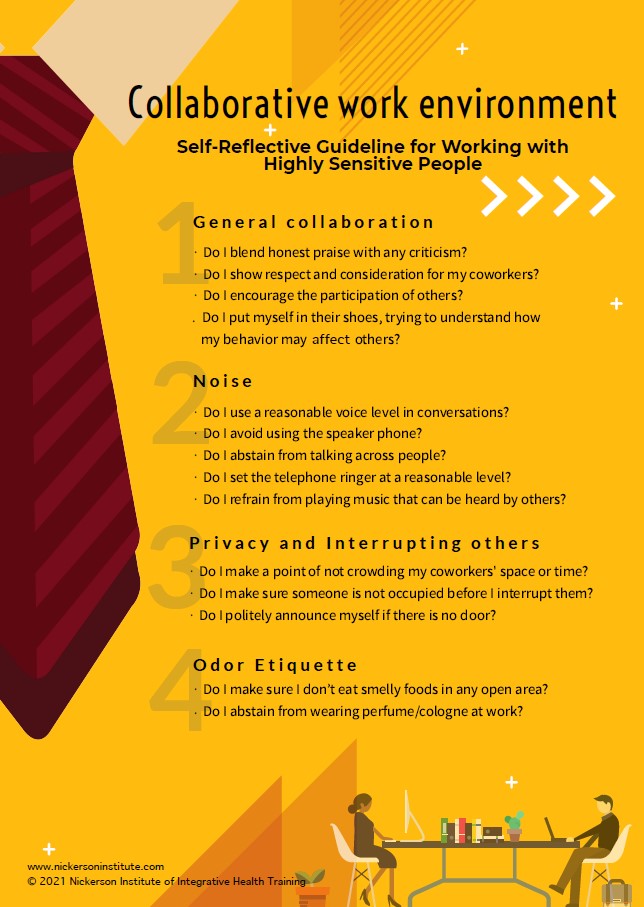In the workplace, the characteristics of the trait can show up as both beneficial and challenging–not only for the HSP, but for their managers and coworkers, too. Managing and working with Highly Sensitive People well is a worthy goal.
In this article, we’ll explore some opportunities that can help build and maintain a healthy, supportive relationship with HSPs and bring out their best performance at work.

Table of Contents
Managers Must Validate the Highly Sensitive Person’s Experience
The first and most important thing you can do as a manager is to validate the HSP’s experience. After 20+ years of scientific research, we know that the trait is real and that those who have the trait experience the world differently. Yet despite this evidence, there are still those who reject it and believe that sensitivity is a character flaw or deficit in one’s personality. I’ve witnessed this first-hand and know the damaging effects it can have on an HSP’s performance and working relationship.
As a manager, your acknowledgment will contribute to their trust, confidence, and ability to better manage the challenges that may present in their daily work routine.
Managers Must Provide Positive Feedback to Highly Sensitive Employees
HSPs tend to be people-pleasers which means they thrive on positive feedback. The more they get, the more they strive to perform. They are fueled by praise, but not necessarily the “in the spotlight” variety. Trophies and public recognition aren’t what we’re talking about. It’s the one-on-one feedback that matters most.
On the flip side of that coin is that they do not take criticism well. It is not only deflating, but (depending on the person and the situation) it is something that can eat away at them, distract them from their work, and keep them up at night as they replay the incident and try to figure out what they could have done differently.
As a manger, this is something to bear in mind while giving routine feedback and while doing performance evaluations. That’s not to say that only positive feedback can be given to HSPs. Yet if you are a manager who does not often give positive feedback, gives mostly negative feedback, and/or focuses on areas for improvement during performance evaluations, know that you are possibly limiting the potential of your HSP employee.
One way you can approach criticism is by blending it with praise — provided, of course, it’s honest praise because HSPs can tell the difference.
Here’s an example: you might say, “I was a bit surprised, considering your attention to detail, that a few points were missed in this report.” Notice that the criticism was prefaced with praise and that the attention was kept on the report instead of the person. It would not be helpful to say, “I’m surprised that YOU missed some of the points in the report.”
Avoid Rushing and Hovering with Highly Sensitive Employees
Positive feedback from coworkers of HSPs is equally important and most HSPs will sincerely reciprocate. Simple remarks of appreciation such as “thanks for your help with this,” or “you did great work on this project,” go a long way in building a supportive, respectful relationship. Of course, that’s true whether someone is highly sensitive or not, so be generous with your praise to all coworkers!
Don’t rush decisions on HSPs who need time to consider every possible outcome. While that means they might be slow to make a decision and get anxious when rushed into one, the insight they can provide when given the time/space to process is invaluable. The ability for risk assessment usually results in the best decision and one of the reasons for that is to see obscure possibilities that others miss.
Don’t hover. Highly sensitive people do not perform well when being watched. Even simple tasks like adding and subtracting can become unintelligible to an HSP if they have someone bearing down on them. I recall in my first job as a secretary, I was typing an extensive report. Back then I could type over 110 words per minute which is very fast. One day, my manager came up behind me and just stood there watching me type. I could feel her eyes on my hands. I should have stopped and asked if she needed anything, but instead, I kept typing. I was surprised that my speed wasn’t affected — not surprised that my accuracy was. Every other word had a mistake.

Looking for an HSP-Trained coach to help you align your life with your priorities?
Through my Highly Sensitive Person (HSP) certification with the Nickerson Institute, as well as being an HSP, I offer HSP coaching to develop specific goals around your HSP needs. We HSPs frequently deal with anxiety and overstimulated nervous systems that prevent us from achieving peace and attaining our life goals. HSP coaching with me includes a detailed review of your sensitivities and a mutually-desired plan for growth and management of this superpower to shift negativity and begin seeing yourself as the hero of your own story. (Affordable monthly coaching begins at $150/month.)
Creating Helpful Work Environments for Highly Sensitive People
Since sensory stimulation is one of HSPs biggest challenges, as a manager or coworker, you can help by being aware of your contribution to the environment.
A few opportunities to be supportive of HSPs include:
- Don’t wear scents to work or keep scented products in your workspace. While scent-free workplaces are much more common now, there are still ways for scents to creep into the environment including cleaning products, laundry soaps, hand creams, and more. Even products that claim to be unscented, sometimes aren’t. Not every HSP is scent-sensitive, but managers may want to take the opportunity to check in with all their staff once in a while.
- Lighting can be another big overwhelm for HSPs, so if you share a common workspace or when you are in a meeting room, be thoughtful of the brightness and positioning. For example, it might be better for the HSP to not face the bright window; or to sit at the back of the room during a big-screen presentation; or dim the lights in the meeting room if there is an option to do so.
- Finally, sound can play a big part in HSP’s overstimulation, concentration, and fight/flight reactions. Consider these aspects of your role in sound stimulus: Are you a loud talker? Do you tend to bang on things (tables, doors, keyboards)? Are you apt to cheer loudly or clap exuberantly in meetings? Do you play music in your workspace? The sounds you make might not have any effect on your HSP colleagues.
- It only takes a thoughtful inquiry to find out. Being conscientious of your behavior is a kind gesture that can contribute to a more productive, healthy environment!
Provide Adequate Breaks to Avoid HSP Overwhelm
Give them a break. Sure, everyone needs some break time, but HSPs are especially susceptible to feeling scattered and/or drained. Not only are their brains processing more information at a deeper level, but they also tend to absorb the energy of people around them and their environment. Having an adequate amount of time to recharge on their own is essential to their health and performance. So if you’re a manager, do what you can to give them the time; and if you’re a coworker, perhaps give them some space.
Remember That Not All Highly Sensitive People (HSP) are the Same
Finally — and possibly the second most important thing you can do concerning your HSP employees — is to remember that not all HSPs are the same, and no one wants to be the “eggshells” person in the room. How to best meet the needs of your highly sensitive employees while nurturing their potential is simply to ask what they need and how you can best support them.
Or establish the guidelines for communication by saying something to the effect of, “I’m counting on you to tell me what you need to be well and perform well here in our organization. Will you do that?”
You won’t be able to provide everything all the time, of course, but knowing you validate their experience and have their best interest in mind will go a long way in getting the best from your highly sensitive employees.
Below is a helpful infographic with tips from this article available to download. Right-click, and “save image as” to download this infographic:
Be sensitive, be free
*This post contains affiliate links and I will be compensated if you make a purchase after clicking on my links*






[…] your home or workspace that are most cluttered. This could be a particular room, closet, or even a desk. Once you have identified the problem areas, you can prioritize which areas to tackle […]